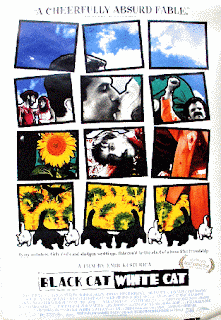 To enjoy an Emir Kusturica film, you need an open heart, a love for irreverence, boisterousness, burlesque, carnival, farce and an ability to laugh easily (like his characters do, especially the older ones), and perhaps a genuine love for Fellini. Emir Kusturica is an acquired taste, and it tastes better if you have the ability to understand and empathise with human frailty.
To enjoy an Emir Kusturica film, you need an open heart, a love for irreverence, boisterousness, burlesque, carnival, farce and an ability to laugh easily (like his characters do, especially the older ones), and perhaps a genuine love for Fellini. Emir Kusturica is an acquired taste, and it tastes better if you have the ability to understand and empathise with human frailty. You see a bit of all these in Kusturica’s Cannes Palme d’Or winner Underground (1995), but not the way these manifest themselves in Black Cat, White Cat (1998). Unlike the previous film, the letter does not deal with the war-torn Yugoslavia and its political reality, at least directly. It concerns a group of gypsies settled on the banks of the river Danube, and how do you put it, things go wild, really, really wild. You can perhaps compare it with an Anees Bazmee film, only much, much better. Genuine madcap.
There’s a proper story here, two love stories actually, two deaths, two marriages, and a pay off where the good guy gets the girl (only thing is, there’s no good guys here), but these things are irrelevant. What matters is what’s happening — a small-time crook, a coke-snorting gangster/war criminal with his molls and bodyguards, a wheel chair bound don who watches Casablanca endlessly, a 17-year-old boy in love with a 25-year-old girl, a girl who’d wait for the love of her life and run away from her marriage, a pig that continues to chew on a run-down car, a love scene among the blooming sunflowers (it’s so beautiful, there’s no way you can describe it), a chase among the goats, a flight of geese, a tryst in the middle of the river on a floating tube, a orchestra band tied to the tree, bonding between grandfather-grandson, the business of hiding a dead body, stealing a trainful of diesel, a tree stump, missing shoes, and more such irreverence. What fun!
>>>>
Black Cat, White Cat is a 1998 Yugoslav Romantic comedy film directed by Emir Kusturica. It won the Silver Lion for Best Direction at the Venice Film Festival. The literal translation of the title is actually "Black cat, white tomcat". The movie characters speak in Romani, Serbian, and Bulgarian - frequently switching among them. More here.
Emir Nemanja Kusturica (born 24 November 1954 in Sarajevo) is a Serbian filmmaker, actor and musician, recognized for several internationally acclaimed feature films. He is a two-time winner of the Palme d'Or at Cannes (for When Father Was Away on Business and Underground), as well as being a Commander of the French Ordre des Arts et des Lettres. Since the mid-2000s, Kusturica's primary residence is Drvengrad, a village in the Mokra Gora region of Serbia. He had portions of the historic village reconstructed for his film Life Is a Miracle. More on Kusturica here.
No comments:
Post a Comment